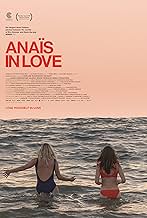IMDb-BEWERTUNG
6,4/10
2241
IHRE BEWERTUNG
Anaïs ist pleite und hat einen Liebhaber, von dem sie glaubt, dass sie ihn nicht mehr liebt. Sie lernt Daniel kennen, der sich sofort in sie verliebt, aber Daniel lebt mit Emilie zusammen, i... Alles lesenAnaïs ist pleite und hat einen Liebhaber, von dem sie glaubt, dass sie ihn nicht mehr liebt. Sie lernt Daniel kennen, der sich sofort in sie verliebt, aber Daniel lebt mit Emilie zusammen, in die sich Anaïs ebenfalls verliebt.Anaïs ist pleite und hat einen Liebhaber, von dem sie glaubt, dass sie ihn nicht mehr liebt. Sie lernt Daniel kennen, der sich sofort in sie verliebt, aber Daniel lebt mit Emilie zusammen, in die sich Anaïs ebenfalls verliebt.
- Regie
- Drehbuch
- Hauptbesetzung
- Auszeichnungen
- 3 Gewinne & 5 Nominierungen insgesamt
Christophe Montenez
- Raoul
- (as Christophe Montenez de la comédie-française)
Empfohlene Bewertungen
Another one of those-almost uniquely French-light but sensitive, flippant but deep, seemingly inconsequential but thought-provoking, inviting shedding after viewing but stubbornly lingering in one's memory; beautifully acted, beautifully filmed; this offering (discovered on a UK free film channel) comes from a long line of similar French films going right back to Eric Rohmer's works and earlier.
Inevitably, one has to have sex scenes, but thankfully the French still know how to portray tasteful eroticism, an art that the American cinema rarely found. My one adverse criticism would be over the director's sometimes edgy camera work (hand held?) that I found a bit fatiguing.
Are the Japanese the only other world cinema consistently putting out these oeuvres?
Inevitably, one has to have sex scenes, but thankfully the French still know how to portray tasteful eroticism, an art that the American cinema rarely found. My one adverse criticism would be over the director's sometimes edgy camera work (hand held?) that I found a bit fatiguing.
Are the Japanese the only other world cinema consistently putting out these oeuvres?
Greetings again from the darkness. Barely five minutes in, we have concluded that Anais is a whirlwind of activity. She's behind on her rent and yet turns the conversation with her landlord to fruit juice and a smoke alarm. This is the first feature film from writer-director Charline Bougeois-Tacquet who benefits greatly with the presence of lead actor Anais Demoustier. I have no idea if the name is a coincidence or whether this was written with her in mind, but we quickly realize that Anais is a mess ... a charming mess and one for which hope remains.
Anais is always late. She walks, runs, or rides her bicycle everywhere. Her bright red lipstick is always on display, and she's claustrophobic and prefers to sleep alone. The constant twinkle in her eye means folks look past her seemingly carefree approach to real life, as she makes the best of each landing spot in her directionless path(s) through each day. We observe and learn all of these things on top of the big secret she's been keeping from her boyfriend Raoul (Christophe Montenez). During the exchange they have when he breaks up with her, she says, "You are violent in your inertia." This may be my favorite line of the year. What others view as stability and dependability, Anais views as inertia and unappealing.
When Anais takes Daniel (Denys Podalydes) as a lover, it's the older, married man who ends it by stating he doesn't want his life to change. Anais shrugs and turns her attention and affections to Daniel's wife, Emilie (Valeria Bruni Tedeschi, HUMAN CAPITAL, sister of Carla Bruni). Emilie is a famous author and Anais worms her way in by tracking Emilie to Normandy where she's holding a symposium. Writing, books, and literature play subtle yet key roles throughout ... as if Anais is trying to live out so many of the stories she's read.
If there is anything lacking here, it's traditional character conflict. Even the surprise collision of Daniel, Emilie, and Anais at the symposium doesn't pack the dramatic or comedic punch we would expect. Anais is never much concerned, so neither are we as viewers. We are too enamored and intrigued with her energy and spirit to let real life cause consternation. The subplot with Anais' mother is the closest we see Anais come to 'normal' emotions, but even getting to that point, is yet another whirlwind.
In theaters April 29, 2022 and On Demand May 6, 2022.
Anais is always late. She walks, runs, or rides her bicycle everywhere. Her bright red lipstick is always on display, and she's claustrophobic and prefers to sleep alone. The constant twinkle in her eye means folks look past her seemingly carefree approach to real life, as she makes the best of each landing spot in her directionless path(s) through each day. We observe and learn all of these things on top of the big secret she's been keeping from her boyfriend Raoul (Christophe Montenez). During the exchange they have when he breaks up with her, she says, "You are violent in your inertia." This may be my favorite line of the year. What others view as stability and dependability, Anais views as inertia and unappealing.
When Anais takes Daniel (Denys Podalydes) as a lover, it's the older, married man who ends it by stating he doesn't want his life to change. Anais shrugs and turns her attention and affections to Daniel's wife, Emilie (Valeria Bruni Tedeschi, HUMAN CAPITAL, sister of Carla Bruni). Emilie is a famous author and Anais worms her way in by tracking Emilie to Normandy where she's holding a symposium. Writing, books, and literature play subtle yet key roles throughout ... as if Anais is trying to live out so many of the stories she's read.
If there is anything lacking here, it's traditional character conflict. Even the surprise collision of Daniel, Emilie, and Anais at the symposium doesn't pack the dramatic or comedic punch we would expect. Anais is never much concerned, so neither are we as viewers. We are too enamored and intrigued with her energy and spirit to let real life cause consternation. The subplot with Anais' mother is the closest we see Anais come to 'normal' emotions, but even getting to that point, is yet another whirlwind.
In theaters April 29, 2022 and On Demand May 6, 2022.
There's a regrettable, sexist tendency for movies to feature ditzy female characters, who are not just young and pretty, but also young (meaning immature) at heart, and in need of a good strong man to take care of them. 'Anais in Love' is almost one of those films, in that its titular protagonist is indeed a bit juvenile; but she's also strong-willed, proactive, and not looking to be saved on anybody else's terms. Indeed, deviating from the traditional rom-com template, she starts out chasing men then falls for a woman. The problem here is rather the ending, which is underwhelming, bland, and critically not the consequence of the character's own actions. We see Anais careering through various affairs throughout the film, then one of these ends, and with that, so does the film. It feels like there's a missing coda, some concluding section where Anais comes to terms with what she has learnt from her experiences or fails to do so. Instead, the film just ends, oddly inconclusively.
This particular movie is a testament of the moral climate of our times. The central character is a young woman living in the affluent West whose actions are dictated by her purely subjective criteria of her own emotional and carnal truth. She is not subject to any outside objective moral code( the obligation to pay the rent to her landlady, the duty to inform intelligibly the foreigners to whom she sublets her appartment about the dangers of certain electrical devices, the fact that her older lover has already a wife, the need to honor her obligations towards her academic supervisor) and everything and everyone has to succumb to her personal quest for self-realization and romantic/sexual interest.
She is very charming and lovable( the female lead is ideal for the role) but hardly a paragon of domestic virtue or a model of a responsible citizen.
She is the embodiment of the western ideal of hedonistic self-actualisation which makes Islamists and Russian ideologues and Chinese Communist Party officials so furious in its insistence on personal choice over tradition and the demands of the collectivity.
Of course this bacchanalian celebration of "anything goes" stumbles over the disapproval of venerable if declining institutions of the West itself such as the Roman Catholic Church. I quote from paragraph 61 of the Apostolic Exhortation Evangelii Gaudium issued by Pope Francis: "...We recognize how in a culture where each person wants to be bearer of his or her own subjective truth it becomes difficult for citizens to devise a common plan which transcends individual gain and personal ambitions." There is a saying attributed to de Gaulle: "How can you govern a country that has 245 kinds of cheese?" The French officials of today must come to terms with the reality of inspiring collective action and prosaic restraint to millions of self-willed hedonists if the behaviour depicted in the movie is representative of a large enough segment of modern French society.
Young and beautiful and irresponsible as an Olympian goddess Anais lives her life as she pleases giving to the pleasure principle precedence over the reality principle if one is to use Freudian terminology. Is such an attitude towards life feasible and sustainable in a long-term or collective level? Is it mature from a psychological standpoint? Is it sinful from a religious point of view? Can significant segments of the affluent West live in such a manner overcoming the realm of necessity and achieving the realm of freedom?
It is a seemingly light movie but if engaged in a deeper manner it raises fundamental questions.
Anais Demoustier and Valeria Bruni Tedeschi give stellar performances and their romance will be included in the anthology of cinematic lesbian romances. Comic interludes as well as certain scenes with sombre undertones interspersed with the frantic activity of Paris and the beauty of the French countryside make for a very appealing result which reinforces the image of the West in general and France in particular as a permissive heaven-on-earth or a society where social bonds are so loose that its collapse is imminent-depending on your point of view.
Either way a must-see if one wants to feel the modern western zeitgeist.
She is very charming and lovable( the female lead is ideal for the role) but hardly a paragon of domestic virtue or a model of a responsible citizen.
She is the embodiment of the western ideal of hedonistic self-actualisation which makes Islamists and Russian ideologues and Chinese Communist Party officials so furious in its insistence on personal choice over tradition and the demands of the collectivity.
Of course this bacchanalian celebration of "anything goes" stumbles over the disapproval of venerable if declining institutions of the West itself such as the Roman Catholic Church. I quote from paragraph 61 of the Apostolic Exhortation Evangelii Gaudium issued by Pope Francis: "...We recognize how in a culture where each person wants to be bearer of his or her own subjective truth it becomes difficult for citizens to devise a common plan which transcends individual gain and personal ambitions." There is a saying attributed to de Gaulle: "How can you govern a country that has 245 kinds of cheese?" The French officials of today must come to terms with the reality of inspiring collective action and prosaic restraint to millions of self-willed hedonists if the behaviour depicted in the movie is representative of a large enough segment of modern French society.
Young and beautiful and irresponsible as an Olympian goddess Anais lives her life as she pleases giving to the pleasure principle precedence over the reality principle if one is to use Freudian terminology. Is such an attitude towards life feasible and sustainable in a long-term or collective level? Is it mature from a psychological standpoint? Is it sinful from a religious point of view? Can significant segments of the affluent West live in such a manner overcoming the realm of necessity and achieving the realm of freedom?
It is a seemingly light movie but if engaged in a deeper manner it raises fundamental questions.
Anais Demoustier and Valeria Bruni Tedeschi give stellar performances and their romance will be included in the anthology of cinematic lesbian romances. Comic interludes as well as certain scenes with sombre undertones interspersed with the frantic activity of Paris and the beauty of the French countryside make for a very appealing result which reinforces the image of the West in general and France in particular as a permissive heaven-on-earth or a society where social bonds are so loose that its collapse is imminent-depending on your point of view.
Either way a must-see if one wants to feel the modern western zeitgeist.
Sometimes, rarely, you come across a film that is so disappointing that you are sort of reeling from it the morning after, thinking you'd better done the accounting, washed your hair, or stared at a patch on your carpet.
This is one of those blessedly rare films.
This film lives or dies by the amount of sympathy you can summon for the scatterbrained, narcissistic, hyperactive protagonist. If you attracted by her, or aspire to be like her, you may make it to the end.
For the rest of us, what remains is a sort of 21st century French comedy cliche' bingo: manic pixie girl? Check! A touch of Amelie Poulain? Check! Slightly nauseating sex scene with an extremely older guy? Check! Mother who has cancer, because that's what older women do right? Check! A touch of sapphic love? Check!
I gave up about two thirds in. I don't know how it ends but I can sort of figure it out. I am also slightly outraged this has been compared with the much superior "The worst person in the world", which features a similar protagonist and similar themes, but with so much more originality and insight.
This is one of those blessedly rare films.
This film lives or dies by the amount of sympathy you can summon for the scatterbrained, narcissistic, hyperactive protagonist. If you attracted by her, or aspire to be like her, you may make it to the end.
For the rest of us, what remains is a sort of 21st century French comedy cliche' bingo: manic pixie girl? Check! A touch of Amelie Poulain? Check! Slightly nauseating sex scene with an extremely older guy? Check! Mother who has cancer, because that's what older women do right? Check! A touch of sapphic love? Check!
I gave up about two thirds in. I don't know how it ends but I can sort of figure it out. I am also slightly outraged this has been compared with the much superior "The worst person in the world", which features a similar protagonist and similar themes, but with so much more originality and insight.
Wusstest du schon
- WissenswertesDirector Charline Bourgeois-Tacquet had already shot a short with actress Anaïs Demoustier, called Pauline asservie (2018), and wrote this movie with her in mind.
- VerbindungenFeatures Opening Night (1977)
- SoundtracksBette Davis Eyes
Performed by Kim Carnes
Top-Auswahl
Melde dich zum Bewerten an und greife auf die Watchlist für personalisierte Empfehlungen zu.
- How long is Anaïs in Love?Powered by Alexa
Details
- Erscheinungsdatum
- Herkunftsland
- Offizielle Standorte
- Sprachen
- Auch bekannt als
- Anaïs in Love
- Drehorte
- Lannion, Côtes-d'Armor, Frankreich(Maez-an-Aod beach)
- Produktionsfirmen
- Weitere beteiligte Unternehmen bei IMDbPro anzeigen
Box Office
- Budget
- 3.000.000 € (geschätzt)
- Bruttoertrag in den USA und Kanada
- 42.941 $
- Eröffnungswochenende in den USA und in Kanada
- 18.351 $
- 1. Mai 2022
- Weltweiter Bruttoertrag
- 491.554 $
- Laufzeit1 Stunde 38 Minuten
- Farbe
- Seitenverhältnis
- 1.85 : 1
Zu dieser Seite beitragen
Bearbeitung vorschlagen oder fehlenden Inhalt hinzufügen

Oberste Lücke
By what name was Der Sommer mit Anaïs (2021) officially released in India in English?
Antwort




























